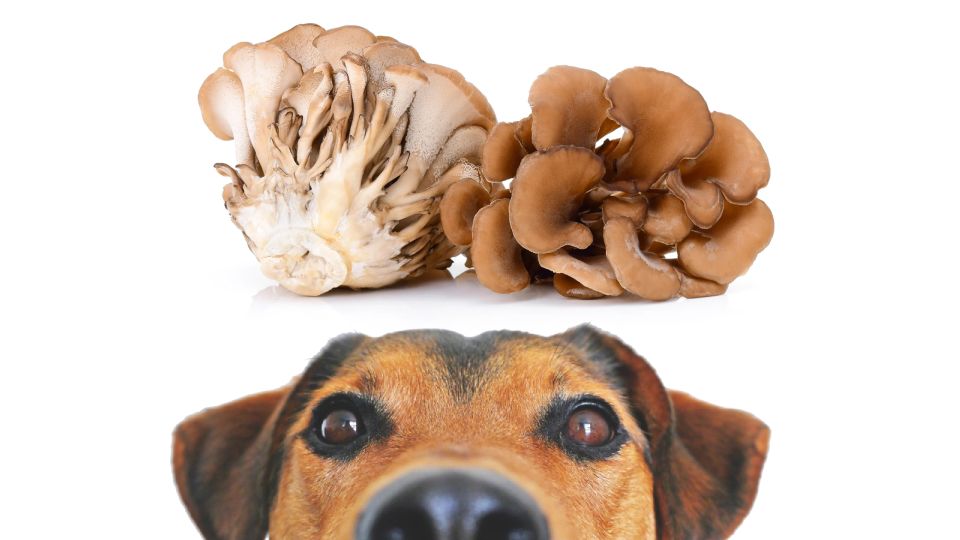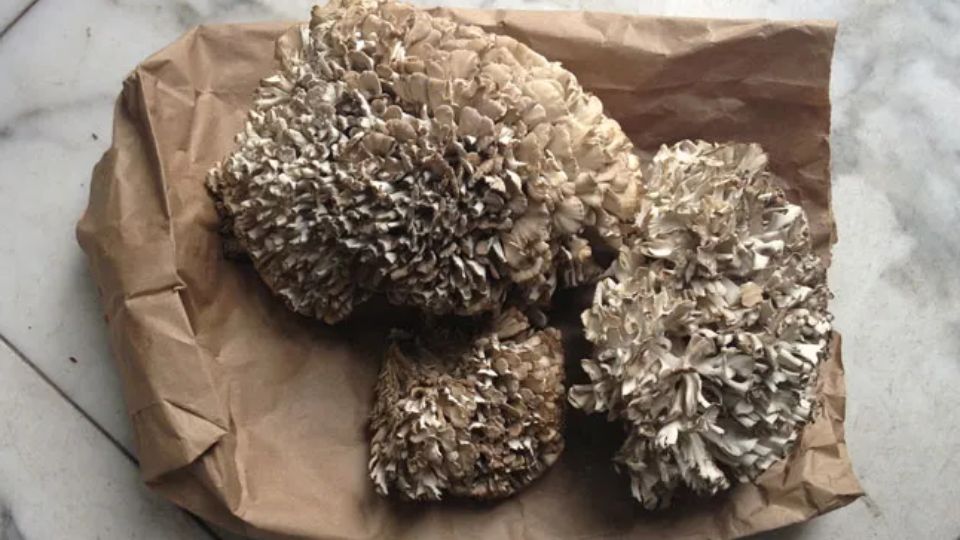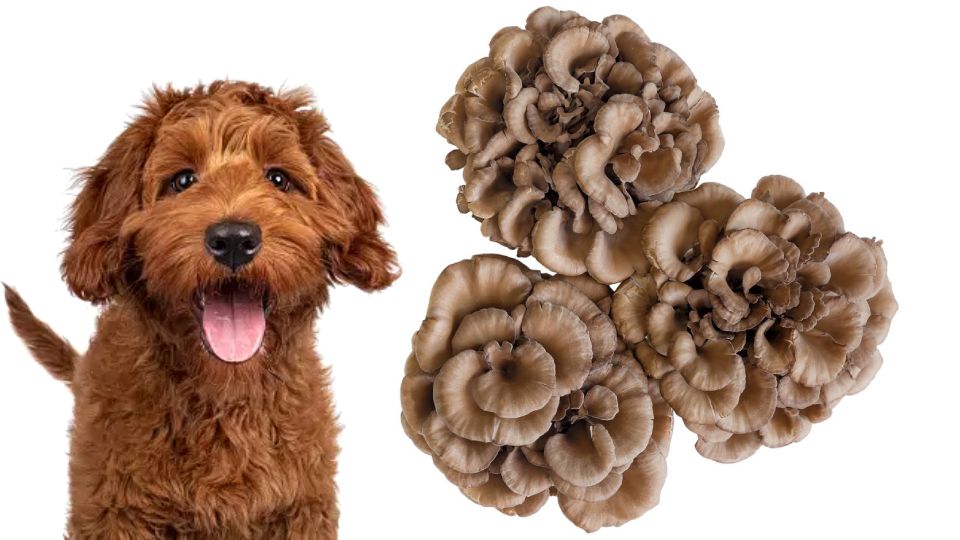Can Dogs Eat Maitake Mushrooms?
As responsible pet owners, it’s only natural to wonder about the suitability of different foods for our furry companions. One intriguing question that often arises is whether dogs can safely consume maitake mushrooms. This article delves into the world of mushrooms, particularly maitake mushrooms, to provide you with a detailed understanding of their potential impact on your canine companion’s health[1].
In this article:
Can Dogs Eat Maitake Mushrooms?
While maitake mushrooms boast impressive health benefits for humans, interestingly, these benefits extend to our four-legged companions. Rigorous research has highlighted three medicinal mushroom species — Maitake (Grifola frondosa), Reishi (Ganoderma lucidum), and Shiitake (Lentinula edodes) — as being exceptionally safe for both dogs and cats.
It’s true, that dogs can indeed enjoy certain types of mushrooms, but with a crucial caveat: the mushrooms should be sourced from a reputable grocery store or regulated supplier like Amazon. The rule of thumb is to avoid wild mushrooms, a danger zone for both canines and humans.
Also, when preparing maitake mushrooms to share with your furry friend, it’s essential to eschew seasonings such as garlic, onion, chives, salt, pepper, and paprika—these are harmful to dogs. Armed with this knowledge, let’s delve into the realm of maitake mushroom benefits for dogs.
Maitake Mushroom Benefits for Dogs

Maitake mushrooms bring a bunch of benefits to your furry friend. Here’s something solid: mushrooms and dogs have a great connection. When you include maitake mushrooms in your dog’s meals, you’re doing them a huge favor. It helps steer clear of cancer, backs up chemo treatments, keeps blood sugar in check, trims down cholesterol, and even gives the liver a boost in handling fat better.
1. Boost Overall Immunity
These mushrooms are chock-full of nutrients and antioxidants that can amp up your dog’s strength and resilience. Just like other mushrooms you can eat, maitake is like a treasure trove of good stuff. And guess what? Those same qualities that give your immune cells a nudge to battle cancer can also help your healthy dog stay, well, healthy[3].
Imagine this: all those powerhouse cells cruising around your body, keeping an eye out for anything fishy. When they spot something off, bam! They go into action, making sure invaders don’t stand a chance. That means less sickness and less inflammation for your furry friend. How awesome is that?
2. Help Prevent and Fight Cancer Growth
Maitake mushrooms have something called beta-glucan, which is a fancy type of carbohydrate. Inside it, there’s this D-fraction that’s pretty cool. It’s known to slow down the growth of tumors, all because it’s great at waking up T-cells – these are like the soldiers that fight against cancer.
T-cells team up with other immune buddies and they’re always on the lookout for stuff that could harm your dog’s health. When they spot something fishy, they go in and take care of it.
A study showed how beta-glucan and D-fraction tackled canine cancer cells. Within just 24 hours, about ninety percent of those bad cells in the experiment were gone. Now, that’s exciting, but remember, it’s not a guaranteed cancer-beater[4].
3. Support for Dogs Taking Chemotherapy
If your dog is going through cancer treatment like chemotherapy, their immune system might take a hit, leaving them more open to getting sick. But guess what? Maitake mushrooms could step in to help.
Here’s how: These mushrooms have the potential to give a boost to special white blood cells called macrophages. These guys are like your pup’s bodyguards – they surround and wipe out harmful intruders and dead cells. And that’s not all – they also rally other immune cells into action. Together, they form a strong team that could really ease the tough effects of chemotherapy.
4. Diabetes Management
Beta-glucan, a complex carb, knows how to keep your blood sugar in check. And guess which mushroom is bursting with these awesome polysaccharides? You got it – the maitake mushroom! Inside the walls of those mushroom cells, this beta-glucan thing helps out with diabetes treatment by naturally bringing down your blood sugar levels. It’s like a friendly helper for your health[5].
5. May Help Your Dog’s Skin and Coat
Maitake mushrooms exhibit potent antioxidant, antibacterial, and anti-aging properties, making them a valuable addition to your dog’s diet. Consumption of these mushrooms can notably enhance your furry companion’s coat, fostering lustrous and vibrant skin and fur. The rich blend of antioxidants helps combat free radicals, promoting overall well-being. Additionally, maitake mushrooms’ antibacterial attributes contribute to maintaining skin health[6].
Side Effects And Risks
Here’s the scoop on looking out for your pup when it comes to feeding them maitake mushrooms:
- Blood sugar and pressure check: Maitake mushrooms can slightly lower blood sugar and pressure. No big deal for healthy dogs, but if your furry friend has diabetes or low blood pressure, watch out.
- Watch those mushrooms: While maitake mushrooms themselves are generally okay, be a detective about where they come from. Wild mushrooms? A no-go! Some can be toxic and really bad for your dog.
- Everyone’s different: Dogs, like us, can have quirks and allergies. When introducing maitake mushrooms, take it slow and keep an eye out. If something seems off, drop the mushrooms and chat with your vet.
- Vet’s wisdom: Before any food changes, even mushroom ones, have a chat with your vet. They know your dog’s health best and can steer you right.
Remember, maitake mushrooms might be helpful, but play it safe. Keep an eye on your pup, and if things get weird, get pro help ASAP. Taking care of your dog’s health is top priority when trying new foods.
What Are Maitake Mushrooms?
Maitake, also known as Hen of The Woods, carries remarkable immune-enhancing properties. This is due to its rich vitamin D2 content, often referred to as the “sunshine vitamin.” Boosting the vitamin D2 levels of any mushroom is easy – just slice them and place them gill-side-up under direct sunlight for a couple of hours. As you do so, these mushrooms, with their wonderful flavor and semi-firm texture, absorb those beneficial rays.
But that’s not all. Maitake holds another valuable role as a potent anti-inflammatory that bolsters your immune system. Within its makeup are natural antioxidants, phenols, flavonoids, and ascorbic acid – a powerhouse combination that forms a protective shield against diseases. As the mushroom ages, its texture evolves from chewiness to a tougher state.
What Are Maitake Mushrooms Good For?
The potential health benefits of maitake mushrooms are nothing short of remarkable. These mushrooms are known to harbor compounds such as beta-glucans, which have been linked to immune system support and a healthy inflammatory response. Moreover, maitake mushrooms have piqued the interest of researchers for their possible anti-cancer properties, although further studies are needed to establish concrete conclusions[2].
In Japan and China, people have traditionally included Maitake in their diets to address diabetes and hypertension.
They are rich in essential nutrients, these mushrooms are prized for their contribution to overall health. The impressive nutritional profile of maitake mushrooms is attributed to their composition, which includes vitamins, minerals, amino acids, and other bioactive compounds.
Nutritional Value of Maitake Mushrooms:
Here’s a condensed table with the top 10 nutrients found in Maitake mushrooms, based on a typical serving size of 100 grams:
| Nutrient | Amount per 100g |
| Calories | 31 kcal |
| Carbohydrates | 6.3 g |
| Dietary Fiber | 2.7 g |
| Sugars | 1.0 g |
| Protein | 2.2 g |
| Fat | 0.4 g |
| Saturated Fat | 0.1 g |
| Sodium | 3 mg |
| Potassium | 212 mg |
| Vitamin C | 1.4 mg |
These values provide a snapshot of the key nutritional components of Maitake mushrooms. Keep in mind that the actual nutrient content can vary slightly based on factors like cultivation and preparation.
Culinary Uses

In the realm of human gastronomy, maitake mushrooms have secured a special place. Their robust flavor and distinctive texture have elevated them to a popular choice in kitchens worldwide. Whether sautéed, grilled, or incorporated into soups, these mushrooms bring a delightful umami essence to a variety of dishes. Furthermore, maitake mushrooms have been revered in traditional medicine for their potential health benefits.
FAQs – Can Dogs Eat Maitake Mushrooms?
Can Dogs Eat Hen of The Woods Mushrooms?
Yes, dogs can eat hen of the woods mushrooms. They’re generally safe and can be a healthy treat. Remember moderation: a small amount occasionally is fine. If you notice any unusual reactions, consult a vet.
What Are The Benefits of Maitake Mushrooms For Dogs?
Maitake mushrooms can offer benefits to dogs when cooked and served in moderation. They may support the immune system and help regulate blood sugar levels. However, consult your veterinarian before adding them to your dog’s diet, as individual needs can vary, and improper preparation can be harmful.
Which Mushrooms Are Safe For Dogs?
Safe mushrooms for dogs include common store-bought varieties like white button, cremini, and portobello mushrooms when cooked. These are non-toxic and can be a healthy occasional treat. However, always serve them in moderation and without added seasonings or oils, as some mushrooms can still upset a dog’s stomach.
Can dogs eat Maitake Mushrooms Raw?
No, it’s not safe for dogs to eat raw Maitake mushrooms. They can be hard to digest and may cause gastrointestinal issues. Cooking Maitake mushrooms thoroughly and serving them in moderation is a safer way to offer this food to your dog, but always consult with a veterinarian before introducing new foods to your pet’s diet.
Which mushrooms are safe for dogs?
Safe mushrooms for dogs, including cooked white button, cremini, shiitake, oysters, and maitake. These varieties can offer potential health benefits when given in moderation. Remember to consult your vet before introducing any new foods to ensure they’re safe for your furry friend.
Can Dogs Eat Maitake Mushrooms? The Final Answer
In summary, dogs can enjoy Maitake mushrooms for their rich nutrient content that bolsters the immune system and helps lower blood sugar levels. These mushrooms offer anti-inflammatory properties that may inhibit tumor growth and enhance immunity.
However, due to their medicinal properties, it’s crucial to provide Maitake mushrooms to your dogs in strict moderation. Cooking them is advisable as it aids in digestion.
Maitake mushrooms can also be incorporated into your dog’s diet through mushroom chews. Adding mushrooms to your dog’s meals can offer various benefits, including cancer prevention, support during chemotherapy, blood sugar regulation, cholesterol reduction, and improved fat metabolism in the liver.
References
1. Structural properties and anti-inflammatory activity of purified polysaccharides from Hen-of-the-woods mushrooms (Grifola frondosa). Retrieved from https://www.researchgate.net/publication/368346795_Structural_properties_and_anti-inflammatory_activity_of_purified_polysaccharides_from_Hen-of-the-woods_mushrooms_Grifola_frondosa
2. B-glucans from Grifola frondosa and Ganoderma lucidum in breast cancer: an example of complementary and integrative medicine. Retrieved from https://www.ncbi.nlm.nih.gov/pmc/articles/PMC5973856/
3. Immunostimulatory and antioxidant activities of the selenized polysaccharide from edible Grifola frondosa. Retrieved from https://www.researchgate.net/publication/358277933_Immunostimulatory_and_antioxidant_activities_of_the_selenized_polysaccharide_from_edible_Grifola_frondosa?_sg=fPdUMhjJmi5pi2Cg9-PV70jk7ZsYe62tAg3zJMqgDGqhIXB7b0WwvneQUwhkuz2qMmHue-cRbGb8PYU
4. The biological activities of the antitumor drug Grifola frondosa polysaccharide. Retrieved from https://www.researchgate.net/publication/332027521_The_biological_activities_of_the_antitumor_drug_Grifola_frondosa_polysaccharide
5. Anti-diabetic activity present in the fruit body of Grifola frondosa (Maitake). I. Retrieved from https://pubmed.ncbi.nlm.nih.gov/7820117/
6. Antioxidant, antibacterial and anti-aging activities of intracellular zinc polysaccharides from Grifola frondosa SH-05. Retrieved from https://www.researchgate.net/publication/311447569_Antioxidant_antibacterial_and_anti-aging_activities_of_intracellular_zinc_polysaccharides_from_Grifola_frondosa_SH-05

